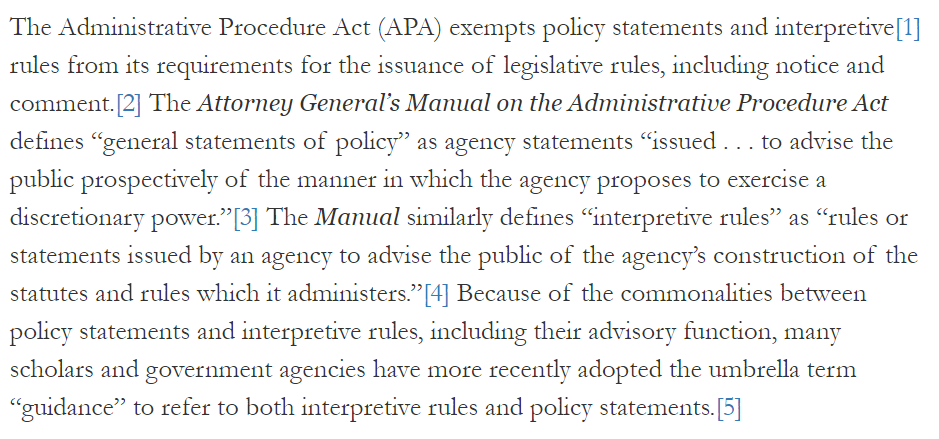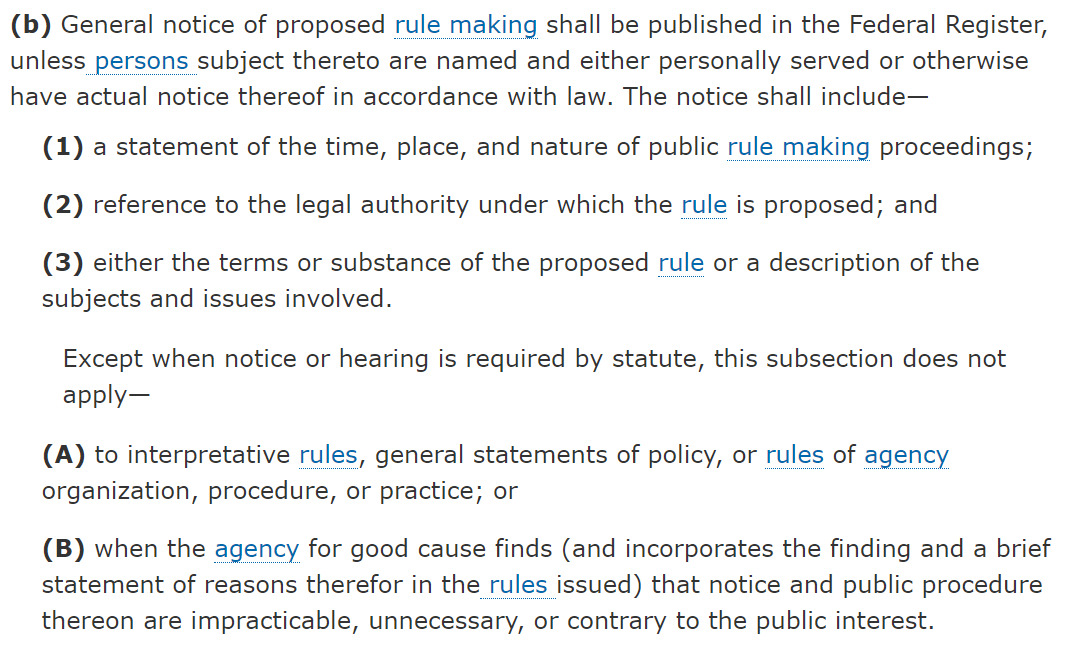I've been wondering: Why rush Simington onto the FCC (with just 5 months of telecom experience) if Pai doesn't have time to vote out a #Section230 order anyway?
I now think the FCC could, and likely will, vote out an order without further comment on January 13
Here's why...
I now think the FCC could, and likely will, vote out an order without further comment on January 13
Here's why...
Even most telecom lawyers assume FCC actions fall into two buckets:
1) rulemakings follow NPRMs and public comment and aren't final until published in the Federal Register
There isn't time for an NPRM/comments and the Biden FCC could block publication in the FedReg anyway
1) rulemakings follow NPRMs and public comment and aren't final until published in the Federal Register
There isn't time for an NPRM/comments and the Biden FCC could block publication in the FedReg anyway
2) Declaratory orders can resolve adjudicatory disputes, but are only binding on the parties to the proceeding, which won't do what the Administration (NTIA) has asked the FCC to do here
But there's actually a third category that the FCC does have time to use here...
But there's actually a third category that the FCC does have time to use here...
An agency can use "interpretive rules" to "advise the public of the agency’s construction of the statutes and rules which it administers
https://www.acus.gov/recommendation/agency-guidance-through-interpretive-rules
https://www.acus.gov/recommendation/agency-guidance-through-interpretive-rules
Most of what the NTIA's petition for rulemaking asks for is exactly that:
—"Interpreting Subsection 230(c)(1) and Its Interaction With Subsection 230(c)(2)"
—"Clarifying Subsection 230(c)(2)"
—"Clarifying Subsection 230(f)(2)"
—"Interpreting Subsection 230(c)(1) and Its Interaction With Subsection 230(c)(2)"
—"Clarifying Subsection 230(c)(2)"
—"Clarifying Subsection 230(f)(2)"
However mistaken I think these proposed "clarifications" are, they're largely interpretive in nature (though some more granular prescriptive requirements might amount to legislative rules)
N.B., an interpretive rule is an “[a]n agency action that merely interprets a prior statute or regulation, and does not itself purport to impose new obligations or prohibitions or requirements on regulated parties.” National Mining Assn. v. McCarthy, 758 F.3d 243, 251–252 (2014)
On what the Pai FCC has time to do, the key procedural detail here is that the APA (5 USC § 553) exempts interpretive rules from the normal requirements of public comment and federal register publication
The reason for this is simple: like policy statements, "interpretive rules do not have the force and effect of law." Perez v. Mortg. Bankers Ass'n, 135 S. Ct. 1199, 1208 (2014)
Again, an interpretive rule tells the public how the agency understands its own statute or rules
Again, an interpretive rule tells the public how the agency understands its own statute or rules
Normally, that means the interpretive rule simply doesn't go into effect until the agency seeks to apply that interpretation, and can be challenged then. The agency's prior interpretation would get only Auer deference ("substantial weight") but not Chevron deference
This report issued by the Administrative Conference (of Federal judges) provides a helpful survey of interpretive rules, how they work in practice, and the complex debate over what deference they get
https://www.acus.gov/recommendation/agency-guidance-through-interpretive-rules
https://www.acus.gov/recommendation/agency-guidance-through-interpretive-rules
If Carr and Simington convince Pai to an interpretive rule, that order may not get any deference in private litigation not involving the FCC
But that's never been the primary point (though Carr does want the FCC to enforce a transparency mandate like that imposed on broadband)
But that's never been the primary point (though Carr does want the FCC to enforce a transparency mandate like that imposed on broadband)
Rather, the point has always been to shake up how courts apply #Section230 in private litigation—or at least appear to
An interpretive order, even without "force of law" could at least deprive websites of the legal certainty that has allowed them to moderate objectionble content
An interpretive order, even without "force of law" could at least deprive websites of the legal certainty that has allowed them to moderate objectionble content
Concretely, as @TechFreedom has warned, NTIA's proposed changes would mean that #Section230 would no longer protect websites for removing Holocaust Denial, hate speech, most foreign election interference, voter suppression, misinformation, etc
https://techfreedom.org/wp-content/uploads/2020/10/Letter-Big-Tech-Hearing-on-230-10.28.20.pdf
https://techfreedom.org/wp-content/uploads/2020/10/Letter-Big-Tech-Hearing-on-230-10.28.20.pdf
This is all to say that, whatever else is motivating the push for Simington, I think we have to assume that the White House still thinks it can get the Pai FCC to issue a "midnight order" reinterpreting #Section230
If so, the FCC would have to release a draft order three weeks before the 1/13, which would be... the Night before the Night before Christmas: 12/23
No, it wouldn't have "legal effect"
Yes, the next FCC could eventually vote to rescind it, but not without a Democratic majority
No, it wouldn't have "legal effect"
Yes, the next FCC could eventually vote to rescind it, but not without a Democratic majority
And that's reason enough for the WH to think this would be worth twisting Pai's arm to do this, especially because, if Simington is confirmed now, there won't be a Republican FCC Commissioner for Democrats to pair their *2* nominations next year with: Rosenworcel and a 3rd Dem
Rosenworcel's term lapsed in June so she disappears from the Commission if she isn't reconfirmed by the end of 2021
Thus, confirming Simington now could not just deadlock the FCC in 2021, but also allow s to gain a 2-1 majority in 2022—and if they keep the senate, through 2024
s to gain a 2-1 majority in 2022—and if they keep the senate, through 2024
Thus, confirming Simington now could not just deadlock the FCC in 2021, but also allow
 s to gain a 2-1 majority in 2022—and if they keep the senate, through 2024
s to gain a 2-1 majority in 2022—and if they keep the senate, through 2024
Confirming Simington now would break the longstanding convention that nominees should be moved in pairs, precisely to avoid this problem, where one side has no incentive to let nominees from the other side through
Thus, an interpretive rule on #Section230 issued this January could well wreck havoc among the courts trying to resolve lawsuits over content moderation for the next four years
For the White House, that would definitely be "owning the libs"
For the White House, that would definitely be "owning the libs"

 Read on Twitter
Read on Twitter




